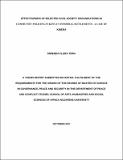| dc.description.abstract | Community policing plays a critical role in maintenance of law and order in the society.
However, the success of community based policing depends on the relationship that the police
and the public cultivates. Traditionally, the ties between the police and the general public have
been frosty and this is likely to affect community based policing which heavily depends on
mutual trust between the parties involved. It is against this background that civil society
organizations have come in to play a mediation role between the public and the police in order to
build confidence and create the culture of trust. This study therefore sought to examine the
effectiveness of the civil society organizations in enhancing community based policing
programmes in Africa’s largest informal settlement- Kibera slums in Kenya. Anchored on the
broken windows theory, the study targeted to collect data from Kibera residents, the police and
the management of civil society organizations in order to examine the activities, ascertain the
extent of participation, investigate the nature of cooperation between these organizations and the
security agencies and finally suggest policy recommendations in view of involvement of CSOs
in community policing. This study employed the descriptive survey research design. The study
utilized both secondary and primary data. Primary data was collected using structured
questionnaires and interview schedule from 384 randomly sampled residents and management
staff of the civil society organizations operating in Kibera’s Makina village. Secondary data was
reviewed from existing studies related to the study. Both quantitative and qualitative data were
collected. Quantitative data was descriptively analysed using the percentages and inferential
statistics while qualitative data was analysed using themes emerging from the data in line with
the study objectives. Analyzed data were presented using charts and tables. The findings of this
study showed that activities of CSOs influenced success of community policing as CSOs are
composed of various professionals with different skills which are crucial for successful
implementation of community policing policies. In addition, there was sharing of information
amongst various entities especially between public and police. Further, the study found that
improving transparency and accountability was effective approach by CSOs in community based
policing. The study concluded that civil society organizations are effective in the implementation
of community policing initiatives in Kibera. The study also concluded that there was sharing of
information amongst the police, medics and the public. The study recommended that there is
need for provision of funds that would enable the CSOs in Kibera informal settlement to offer
medical help and mental assistance. There is also need for CSOs to include legal practitioners
and social workers within their midst so as to increase the frequency and value of these activities.
The findings will be beneficial to policy makers at the Ministry of interior, security agencies and
the residents of Kibera. | en_US |

